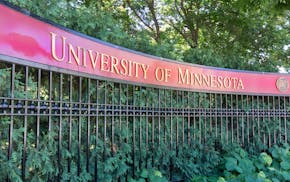Saying their north Minneapolis mortgage fraud scheme was founded on lies and based in an impossible "dream world" of ever-rising prices, a federal judge on Thursday concluded one of the Twin Cities' largest real estate fraud cases by sentencing a pair of former investors to prison.
"You knew very well at the time that what you were doing couldn't be done without you lying about it," U.S. District Judge Joan Ericksen lectured as she sentenced Jonathan Helgason to eight years in federal prison and Thomas Balko to seven years for their roles in the TJ Waconia fraud case.
The pair pleaded guilty a year ago to fraud in a three-year scheme that the government said involved $35 million in mortgages on 162 properties, helping to make north Minneapolis the epicenter of foreclosures in the state.
Ericksen said she "utterly rejected" their attorneys' argument that losses attributed to the scheme can be blamed on the collapsed housing market.
Helgason, 46, of Chisago City, and Balko, 38, of Rogers, apologized for the scheme before Ericksen sentenced them.
"I don't consider myself an extremely sophisticated person," Helgason said. "We merely saw an opportunity in north Minneapolis for growth and we bought properties for gain." Balko told Ericksen: "Like I tell my children, there are responsibilities for your actions."
The pair, who co-owned Roseville-based TJ Waconia, bought and then resold houses for inflated prices to straw-buyer investors, mostly in north Minneapolis.
Barbara Johnson, a council member for part of the affected area, was the government's lead witness. She testified about how houses that passed through TJ Waconia turned into neighborhood problems that demanded inordinate police and inspector time.
Don Samuels, another North Side council member who attended the sentencing, said it represented at least some justice to compensate for the havoc wreaked upon the neighborhood.
"I get emotional about it, so I could never be satisfied," he said. "But within the legal guidelines, it's a good outcome."
'An enormous disaster'
Assistant U.S. Attorney Joseph Dixon described the men's trail of transactions as "an enormous disaster" that kept shifting risk to new buyers of the homes in a type of Ponzi scheme. Because the rents from the properties covered only half of what Helgason and Balko were obliged to pay investors, it couldn't succeed without a dramatic rise in housing prices, Dixon said.
"It was doomed to failure from the outset," Dixon told Ericksen. He also cited numerous warnings from market forecasters and the popular press of a potential housing market collapse that he said the pair ignored.
Helgason got a longer sentence because he holds a state real estate license that put him in a position of public trust. Ericksen also bluntly told Helgason that she's not satisfied that he's been forthcoming on disclosing his finances and that she wasn't persuaded that he'd fully taken responsibility.
The government said that TJ Waconia obtained $35 million in mortgages through fraudulent means, gaining $14 million on the resale of the houses to investors they recruited. But Edward Adams, a University of Minnesota law professor, said his analysis for the defendants found that rising interest rates and foreclosures depressed housing to the point where just $3.6 million in losses could be attributed to the scheme.
Dixon had asked for a sentence at the top end of the recommended guidelines of 121 to 151 months for Helgason and 97 to 121 months for Balko. Their attorneys sought 33 to 46 months. The amount of restitution required from both men, whose attorneys said they are broke, is scheduled to be set at a hearing in late May. Erickson agreed to recommend imprisonment in Minnesota for them.
"The lengthy imprisonment sentence sends a very clear message that mortgage fraud is a serious offense with serious consequences on the community, and that it will be addressed by the courts with severe consequences," Dixon said afterward.
Steve Brandt • 612-673-4438

Teen suspect in Nudieland mass shooting arrested on murder, assault charges
'Human error' behind Robbinsdale shelter-in-place alert that was mistakenly sent countywide

Going to Wolves or Twins tonight? How to get there (and maybe avoid traffic).
Focusing on bringing football film into frame

